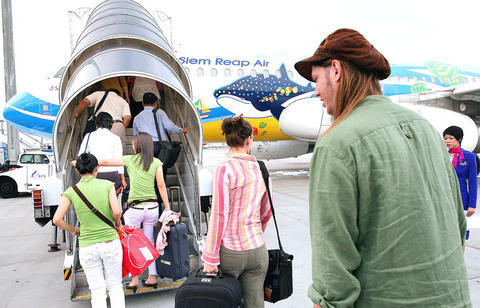Low-cost carriers are dramatically expanding their network of flights across the Mekong region, encouraging record numbers of Southeast Asian tourists to explore neighboring countries.
Thailand's top budget airline, Thai AirAsia, plans to double its flights from Bangkok to Hanoi and Phnom Penh next month, while adding Shenzhen as its third destination in China.
Air Bagan, Myanmar's largest private carrier, launched its first international flight last month linking Bangkok with Yangon.

PHOTO: AFP
Deals are also in the works for direct flights between Cambodia's Angkor temple town of Siem Reap and Myanmar's top tourist spots Bagan and Mandalay.
"Low-cost carriers bring ever more city-pairs into the equation," aided by relaxed aviation rules among major Southeast Asian capitals, said John Koldowski, spokesman for the Pacific Asia Travel Association (PATA) in Bangkok.
As people in the region see their disposable incomes grow steadily, many are proving willing to splash out on travel, especially for affordable destinations within the region, Koldowski said.
Thai visitors to Cambodia soared 38 percent in the first four months of the year, while the number of Vietnamese travellers jumped 70 percent, according to Cambodia's tourism ministry.
Cambodian Tourism minister Thong Khon said travellers from the two countries are helping to boost the nation's tourism industry.
Overall arrivals to Cambodia had grown by 20 percent year-on-year to more than 710,000 as of April. PATA expects the trend to continue in the coming years.
The number of Thai tourists to Cambodia is expected to jump 34 percent over the next two years to 85,400, while visitors to Myanmar are seen rising by 13 percent to 48,400 over that period, PATA says.
Vietnam is also more popular, with arrivals from Thailand expected to jump 17 percent to 126,000 in two years.
In Myanmar, Thais are the top foreign visitors, but many use land crossings as well as flights.
"We hope more tourists will be coming this year as we extend flight connections to international destinations," an official from Myanmar's tourism official said.
For Thais, the increased desire to travel is all the more remarkable because of the economic slowdown at home.
Soraya Srimit, 31, from Bangkok is heading to Hanoi next month on holiday despite her concerns about the economy.
"I thought I should keep that money for a rainy day, because the economy is unlikely to recover until early next year," Soraya said.
"But I found an attractive package from AirAsia, and I really wanted to taste authentic Vietnamese cuisine in Hanoi," she said.
Political turmoil in Thailand has led to almost monthly downgrades in the nation's economic forecasts. The downturn has hurt Jakara Samarnthae's construction business, but he still plans to visit Hanoi later this year.
"A low-cost air fare will make my first overseas trip possible," the 63-year-old said.
The number of Thais travelling overseas rose 20 percent last year to 3.3 million, and their favorite destinations were Vietnam, Laos and China, according to the Tourism Authority of Thailand (TAT).
"With airlines, especially budget carriers, expanding their route networks, countries in the region ... have become more accessible to each other," said Juthaporn Rern-gronasa, TAT's deputy governor for international marketing.

NATIONAL SECURITY THREAT: An official said that Guan Guan’s comments had gone beyond the threshold of free speech, as she advocated for the destruction of the ROC China-born media influencer Guan Guan’s (關關) residency permit has been revoked for repeatedly posting pro-China content that threatens national security, the National Immigration Agency said yesterday. Guan Guan has said many controversial things in her videos posted to Douyin (抖音), including “the red flag will soon be painted all over Taiwan” and “Taiwan is an inseparable part of China,” while expressing hope for expedited “reunification.” The agency received multiple reports alleging that Guan Guan had advocated for armed reunification last year. After investigating, the agency last month issued a notice requiring her to appear and account for her actions. Guan Guan appeared as required,

Japan and the Philippines yesterday signed a defense pact that would allow the tax-free provision of ammunition, fuel, food and other necessities when their forces stage joint training to boost deterrence against China’s growing aggression in the region and to bolster their preparation for natural disasters. Japan has faced increasing political, trade and security tensions with China, which was angered by Japanese Prime Minister Sanae Takaichi’s remark that a Chinese attack on Taiwan would be a survival-threatening situation for Japan, triggering a military response. Japan and the Philippines have also had separate territorial conflicts with Beijing in the East and South China

A strong cold air mass is expected to arrive tonight, bringing a change in weather and a drop in temperature, the Central Weather Administration (CWA) said. The coldest time would be early on Thursday morning, with temperatures in some areas dipping as low as 8°C, it said. Daytime highs yesterday were 22°C to 24°C in northern and eastern Taiwan, and about 25°C to 28°C in the central and southern regions, it said. However, nighttime lows would dip to about 15°C to 16°C in central and northern Taiwan as well as the northeast, and 17°C to 19°C elsewhere, it said. Tropical Storm Nokaen, currently

PAPERS, PLEASE: The gang exploited the high value of the passports, selling them at inflated prices to Chinese buyers, who would treat them as ‘invisibility cloaks’ The Yilan District Court has handed four members of a syndicate prison terms ranging from one year and two months to two years and two months for their involvement in a scheme to purchase Taiwanese passports and resell them abroad at a massive markup. A Chinese human smuggling syndicate purchased Taiwanese passports through local criminal networks, exploiting the passports’ visa-free travel privileges to turn a profit of more than 20 times the original price, the court said. Such criminal organizations enable people to impersonate Taiwanese when entering and exiting Taiwan and other countries, undermining social order and the credibility of the nation’s